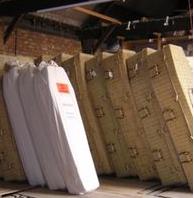 Alyssa Williams,
Alyssa Williams,
Natural Resource Report Writer
Afraid of leaving a carbon footprint when you leave for the hereafter? Well, look no further than Cynthia Beal’s Natural Burial Company in Eugene, Ore., the foremost distributor for biodegradable coffins in North America. The Natural Burial Company gives Portland and other U.S. cities alike more inexpensive, personalized and natural burial alternatives. Portland’s Mt. Scott Funeral Home now provides clients an option of biodegradable caskets or natural cremation containers and a no-embalming choice. Beal also has a shop in north Portland where you can buy her recycled paper “ecopods.”
According to the Oregon Mortuary and Cemetery Board, caskets and other funeral merchandise are not required by law.
Going green for a burial service can not only be eco-friendly, but financially savvy. With an average casket costing about $2,000, prices can quickly rise after additional embalming and cemetery plot purchases.
Meanwhile, the Natural Burial Company coffins start at $85. Beal also gives a wide variety of options such as seagrass, willow, and cardboard coffins. The company even offers the “Everybody Coffin,” a tool-free assembly kit made of Ceiba Pentandra wood, priced at $389.
All of these selections are meant to limit the 827,060 gallons of embalming fluid, the 90,272 tons of steel (caskets), and the 30 million board feet of hardwoods (caskets) she claims go into the ground each year due to traditional burial practices.
A condensed version of Beal’s forthcoming book “Be a Tree; the Natural Burial Guide for Turning Yourself into a Forest” details how current Oregonian green burial practices were modeled after and made possible by England’s successful woodland burial movement.
The Natural Death Centre in the UK launched the Association of Natural Burial Grounds in 1994. More than 200 woodland or green burial sites are now open or planned around the UK where members often plant “commemorative trees instead of head stones.”
Ken West, one of the UK founders of the first modern woodland burial sites in 1993, originally planned the grounds as a biodiverse oak forest by planting an oak whip on each unmarked grave. West breaks assessing the environmental impacts of a funeral into 11 areas: embalming, coffin, floral tributes, burial, cremation, energy on disposal of body, road miles on funeral, memorial, grieving waste, grieving road miles and site management.
Whether you chose to go green or select a more traditional means of burial, Beal just advocates for environmentally conscious decisions and more opportunities for choice.
“You don’t have to be buried in a natural burial ground to make your last moments greener ones,” Beal wrote. “By planning ahead (so others don’t have to guess or make the tough decisions for you), by choosing your process and your container in advance, and by making it clear you want no synthetic materials on your last ride, you’ll go a long way toward improving what might otherwise be quite the opposite of what you’d wish, if someone could ask you after the fact.”
— Alyssa Williams
Disclaimer: Articles featured on Oregon Report are the creation, responsibility and opinion of the authoring individual or organization which is featured at the top of every article.


